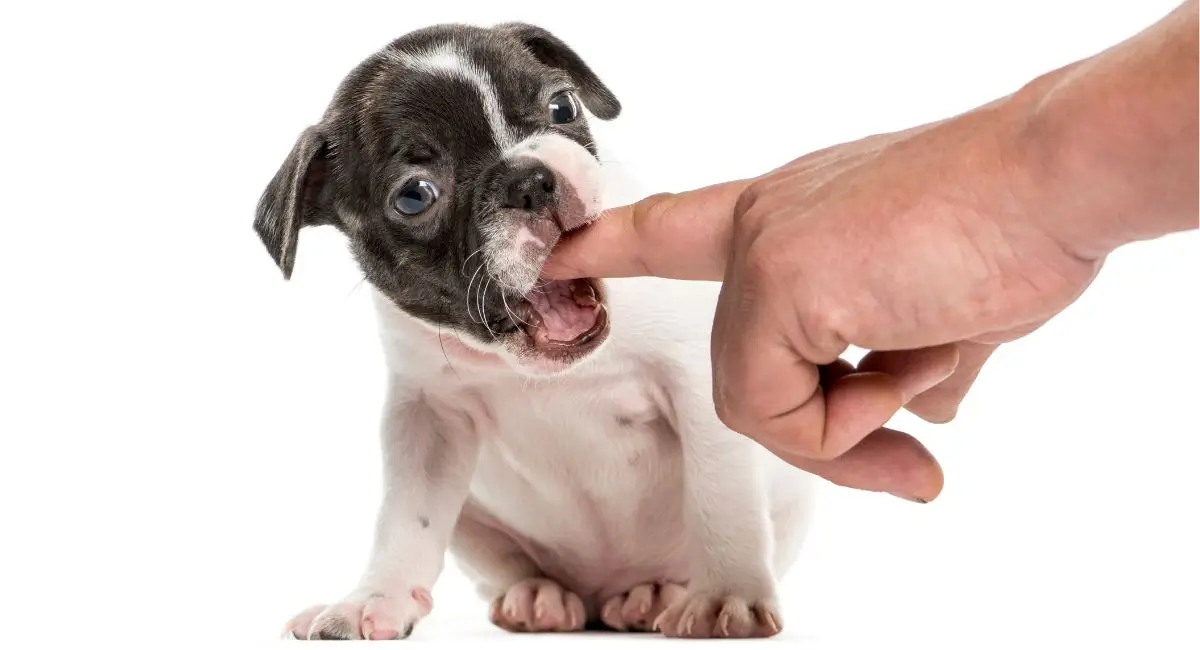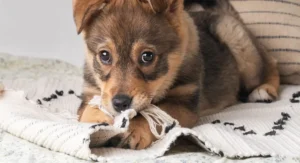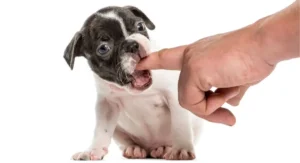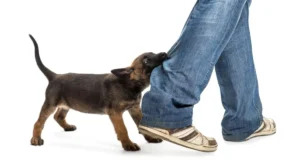There are many new puppy owners who wonder how to handle the challenge of playful biting with their puppies, but are concerned about the behavior. You are not alone! Many new puppy owners want to find effective solutions to the problem of playful biting.
In order to protect your puppy from biting, you should train him to stop biting at an early age. Having a comprehensive understanding of puppy biting is crucial for the development of your puppy and to your peace of mind. In order to succeed, we need to understand their behavior, establish a solid training foundation, and implement the most effective training techniques possible. Let’s get started!
How To Understand Puppy Biting
Why Do Puppies Bite?
Just like human babies, puppies explore their world with their mouths. Their biting helps them learn about their environment and social boundaries. It is a natural instinct for puppies to bite, teething, and play. Teething can also cause discomfort in puppies, leading them to chew on objects to relieve it.
Typical Triggers
There are a number of reasons why puppies bite. It is common for puppies to bite to express their energy when overly excited. It is also possible for puppies that are afraid or anxious to bite as a defense mechanism. Boredom can also lead to destructive chewing behaviors, in which puppies seek stimulation through biting.
Creating The Foundation For Training
Keeping Consistent Is The Key
Use consistency in training methods to prevent confusion and reinforce appropriate behavior. Consistency will help puppies understand what is expected of them and will speed their development.
Rewarding Positive Behavior
The use of positive reinforcement involves rewarding your puppy for positive behavior, which encourages them to repeat it. Treats, praise, and affection can be great rewards. For example, if your puppy stops biting and follows a command, you can reward him with a treat.
Maintaining A Safe Environment
You need to provide a safe space for your puppy with appropriate toys and ensure that the environment is free of hazards that encourage unwanted chewing. If your puppy is prone to biting, putting a designated chewing area with chewing toys is a great way to redirect this behavior.
Techniques For Effective Training
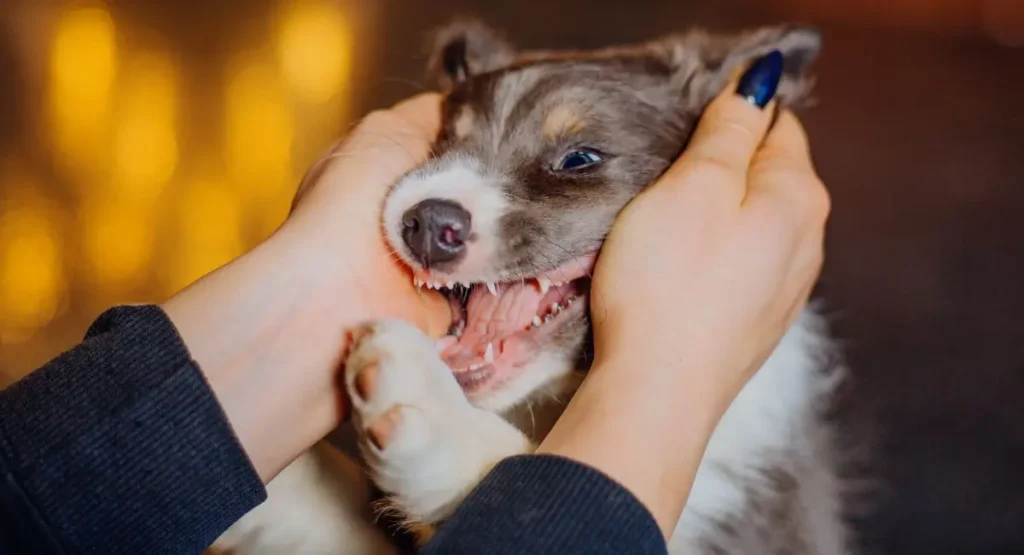
The Redirection Of Bites
Use chew toys specifically designed for teething puppies to redirect their attention and provide relief during teething. Toys like KONG Puppy Chew Toys are durable and provide relief during teething.
Toys That Interact
Playing with puzzle toys and treat-dispensing toys can take their attention away from biting and redirect it to solving challenges. The Outward Hound Hide-A-Squirrel Puzzle Toy is an excellent toy for keeping puppies occupied.
Teething Toys To Chew
There are many toys designed to relieve teething discomfort in puppies. Think about toys which are safe and durable, such as Nylabone Puppy Chew Toys, which are designed to endure vigorous chewing and relieve discomfort in puppies.
Teaching ‘no’ Or ‘ouch’ Commands.
To teach your puppy commands like ‘No’ or ‘Ouch,’ follow these steps:
- When your puppy bites, say ‘No‘ or ‘Ouch‘ in a firm but calm voice.
- Stop playing and ignore your puppy for a few seconds.
- Resume playing and reward your puppy when they stop biting.
Time-Out Method
Time outs involve temporarily isolating your puppy from other puppies after they bite one another. They should be placed in a secluded area or a quiet room for a short period of time, about 1-2 minutes. This will assist them in understanding that biting results in a loss of attention or playtime.
Inhibition Of Bites
The basic principle of bite inhibition training is to teach puppies to control the force with which they bite. Engage your puppy in gentle play and reward them whenever they use a soft mouth. If he bites too hard, redirect his attention to a toy and reward him when he behaves gently.
Managing Biting In Different Situations
Playing With A Bite
You can easily manage chewing during playtime by using interactive toys and avoiding rough play when your puppy bites. If your puppy bites, redirect their attention to a toy and reward them when they engage positively. Consistent play routines can also prevent biting.
Over Excited Biting
Depending on how excited your puppy may be, he or she may bite due to a high level of energy. In order to calm your puppy down, use soothing techniques like petting and speaking calmly. Providing a safe space with chew toys is another way to redirect his or her energy.
Fear Or Anxiety-Related Biting
The bites of puppies may be the result of a puppy’s fear or anxiety. It is important to identify and address the underlying cause of the puppy’s anxiety, and to gradually expose the puppy to various environments, people, and experiences. If the anxiety persists, consider consulting with a professional dog trainer.
Developing The Right Behavior
Reward System
Developing a reward system to reinforce desired behaviors is essential. For example, treats, praise, and playtime should be used as rewards. Consistently rewarding desired actions reinforces desired actions and helps your puppy learn as fast as possible.
Acting In A Consistent Manner
The consistency in your commands and actions ensures that your communication is clear. Your puppy will be more likely to follow your instructions if they understand what is expected of them. Consistency builds trust between you and your puppy.
Progress Monitoring
It is essential to keep track of your puppy’s progress and adjust your training methods as necessary. Keep a journal in which you will note both their progress and the challenges they face. Regularly assess their behavior to ensure effective training and make any necessary adjustments.
How To Avoid Common Mistakes
Inconsistency In Training
Inconsistent training can confuse your puppy and hinder his progress. It is vital to follow a routine and to use the same commands and rewards on a consistent basis. It is also vital to avoid mixed signals and to make sure all family members follow the same training routine.
Rewarding Negative Behavior
The use of negative reinforcement, such as punishment, can harm your puppy’s trust, which can negatively impact its well-being and confidence. Instead, use positive reinforcement techniques to encourage positive behavior. Rewarding positive behavior encourages desirable behavior.
Ignoring The Root Cause
It is essential to identify the triggers that cause dogs to bite and resolve them so that biting can be prevented in the future. Ignoring the root cause can lead to persistent behavior problems.
Professional Help And Resources
When To Seek Professional Help
As long as you are not seeing any progress in your puppy’s biting behavior despite your daily efforts to train him, it may be time to seek professional assistance. If your dog keeps biting regardless of training, it may be time to seek professional help from a professional dog trainer.
Recommended Resources
Explore books, online courses, and websites for further reading and assistance. Some recommended resources include:
- “The Art of Raising a Puppy” by The Monks of New Skete
- Puppy training classes offered by local trainers
- Online courses on platforms like Udemy and Coursera
Conclusion
If you are committed to training your puppy to stop biting you will need patience, consistency, and positive reinforcement to get your puppy to stop biting as soon as possible. Understanding your puppy’s behavior, setting up a strong training foundation, and using effective techniques can help you to shape your puppy into a well-behaved pet.
In the end, every puppy is unique, and progress may vary from puppy to puppy, so it is important to remain committed to the training process, and seek professional help if needed. Share your experiences or ask questions in the comments below – your answers can help fellow puppy owners on their training journeys as well.
Frequently Asked Questions
How Do You Discipline A Biting Puppy?
Discipline a biting puppy using positive reinforcement techniques. Redirect their attention to toys, reward appropriate behavior, and use consistent commands like ‘No’ or ‘Ouch.’
How To Train A Puppy Not To Bite?
Training a puppy not to bite by providing appropriate chew toys, using positive reinforcement, and teaching commands like ‘No’ or ‘Ouch.’ Consistency and patience are key.
What Age Does A Puppy Stop Biting?
Puppies stop biting as they mature, usually around 6-8 months of age. Consistent training and proper socialization can accelerate this process.
What Command Stops A Puppy From Biting?
Commands like ‘No’ or ‘Ouch’ can stop a puppy from biting. Pair these commands with positive reinforcement to reinforce desired behavior.
Do Puppies Grow Out Of Biting?
Yes, puppies generally grow out of biting as they mature and receive proper training. Consistent training and positive reinforcement accelerate this process.
Should I Ignore Puppy Bites?
Ignoring puppy bites may not work. Instead, use redirection, positive reinforcement, and consistent commands to discourage biting behavior and promote positive actions.
Recommended Articles

